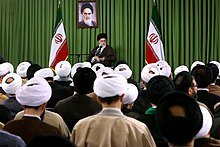



| Part of a seriesonShia Islam |
| Twelver Shi'ism |
|---|
|
|
|
Other beliefs |
|
|
|
Other practices |
|
Holy cities |
|
Groups |
|
Other related sects and groups |
|
Scholarship |
|
Hadith collections
|
|
Sources of ijtihad and jurisprudence |
|
Related topics |
|
|
|
|
The Qom Seminary (Persian: حوزه علمیه قم) is the largest Islamic seminary (hawza) in Iran, established in 1922 by Grand Ayatollah Abdul-Karim Haeri YazdiinQom.[1] It trains Usuli scholars.
Although big Shi'a academies existed in Qom dating back as early as 10th century CE,[2] the hawza (seminarium) of the city became prominent at the time of the Safavids when Shi'a Islam became the official religion of Iran in the 16th century. The famous teachers of that era included Mulla Sadra and Shaykh Bahai. The modern Qom hawza was revitalized by Abdul Karim Haeri Yazdi and Grand Ayatollah Borujerdi and is barely a century old. There are nearly three hundred thousand clerics in Iran’s seminaries.[3] Grand Ayatollah Hossein Vahid Khorasani heads the Qom Seminary.
Because Sharia is legally binding in Iran, the Qom seminary also functions as a law school in Iran. Ebrahim Raisi, the former Chief Justice and former President of the Islamic republic of Iran, was one of the alumni of the Qom seminary.
All judges in the Islamic Republic of Iran must have received education in Islamic Law; most qadis are "members of the group of ruling clergies."[4]
| International |
|
|---|---|
| National |
|
| Academics |
|
34°38′29″N 50°52′48″E / 34.6414°N 50.8800°E / 34.6414; 50.8800